University of Western Cape Language Education Research Report
VerifiedAdded on 2023/01/18
|15
|3280
|90
Report
AI Summary
This report examines the state of language education in South Africa, focusing on the challenges related to English proficiency in classrooms. The research, conducted in 2019, investigates the historical context of language use, particularly the shift from mono-cultural classrooms to diverse environments post-1994. The study addresses the low proficiency of English among South Africans, its impact on education, and the need for improved language competence. The report reviews existing literature, highlighting issues like inadequate language proficiency among both students and staff, linguistic alienation, and the lack of proper assessment tools. The research methodology includes participant observation and questionnaires to gather data, aiming to identify the extent of the problem and propose solutions for enhancing English language skills in educational settings and beyond. The study emphasizes the importance of language proficiency for academic success, economic emancipation, and intercultural interactions.
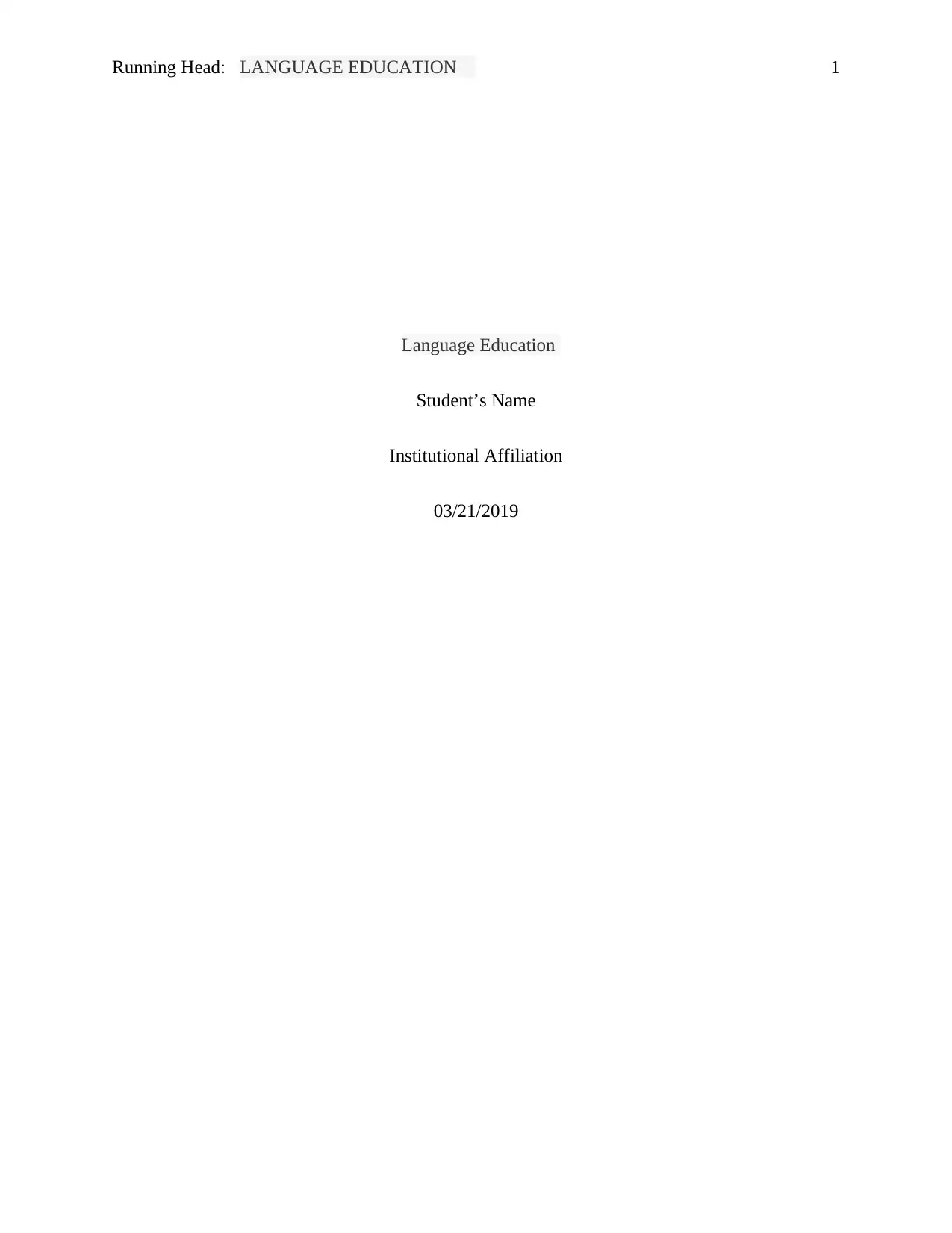
Running Head: LANGUAGE EDUCATION 1
Language Education
Student’s Name
Institutional Affiliation
03/21/2019
Language Education
Student’s Name
Institutional Affiliation
03/21/2019
Paraphrase This Document
Need a fresh take? Get an instant paraphrase of this document with our AI Paraphraser
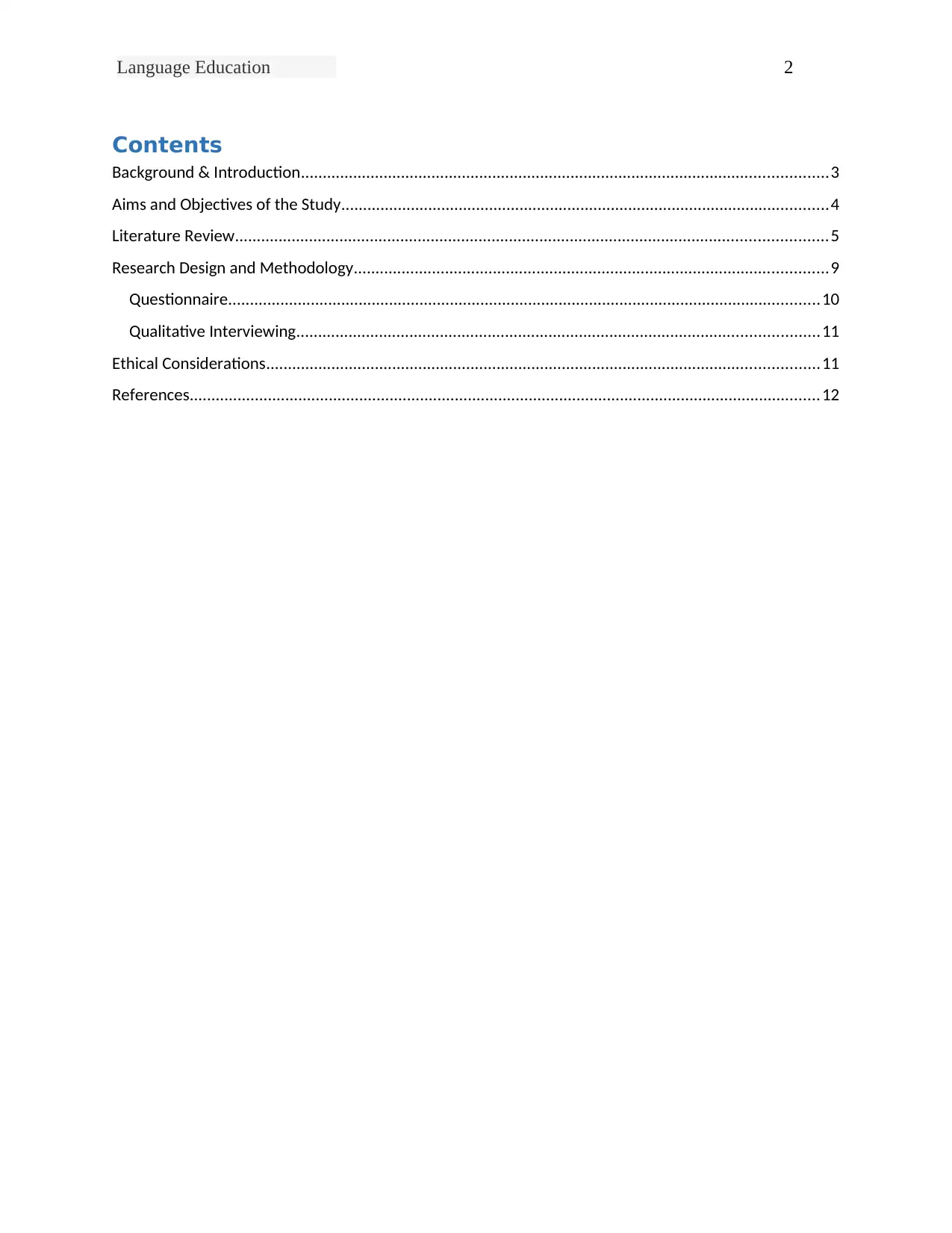
Language Education 2
Contents
Background & Introduction.........................................................................................................................3
Aims and Objectives of the Study................................................................................................................4
Literature Review........................................................................................................................................5
Research Design and Methodology.............................................................................................................9
Questionnaire........................................................................................................................................10
Qualitative Interviewing........................................................................................................................11
Ethical Considerations...............................................................................................................................11
References.................................................................................................................................................12
Contents
Background & Introduction.........................................................................................................................3
Aims and Objectives of the Study................................................................................................................4
Literature Review........................................................................................................................................5
Research Design and Methodology.............................................................................................................9
Questionnaire........................................................................................................................................10
Qualitative Interviewing........................................................................................................................11
Ethical Considerations...............................................................................................................................11
References.................................................................................................................................................12
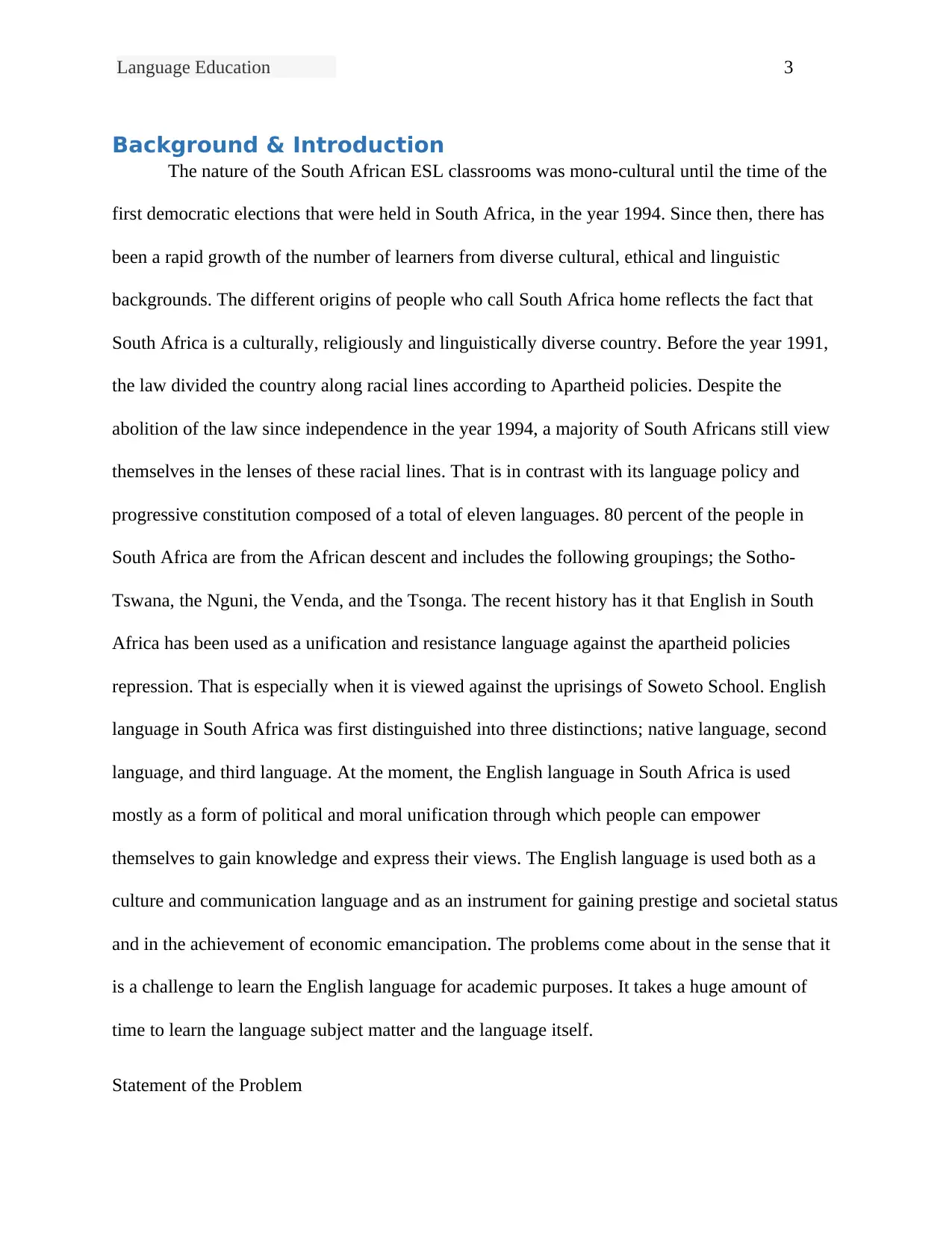
Language Education 3
Background & Introduction
The nature of the South African ESL classrooms was mono-cultural until the time of the
first democratic elections that were held in South Africa, in the year 1994. Since then, there has
been a rapid growth of the number of learners from diverse cultural, ethical and linguistic
backgrounds. The different origins of people who call South Africa home reflects the fact that
South Africa is a culturally, religiously and linguistically diverse country. Before the year 1991,
the law divided the country along racial lines according to Apartheid policies. Despite the
abolition of the law since independence in the year 1994, a majority of South Africans still view
themselves in the lenses of these racial lines. That is in contrast with its language policy and
progressive constitution composed of a total of eleven languages. 80 percent of the people in
South Africa are from the African descent and includes the following groupings; the Sotho-
Tswana, the Nguni, the Venda, and the Tsonga. The recent history has it that English in South
Africa has been used as a unification and resistance language against the apartheid policies
repression. That is especially when it is viewed against the uprisings of Soweto School. English
language in South Africa was first distinguished into three distinctions; native language, second
language, and third language. At the moment, the English language in South Africa is used
mostly as a form of political and moral unification through which people can empower
themselves to gain knowledge and express their views. The English language is used both as a
culture and communication language and as an instrument for gaining prestige and societal status
and in the achievement of economic emancipation. The problems come about in the sense that it
is a challenge to learn the English language for academic purposes. It takes a huge amount of
time to learn the language subject matter and the language itself.
Statement of the Problem
Background & Introduction
The nature of the South African ESL classrooms was mono-cultural until the time of the
first democratic elections that were held in South Africa, in the year 1994. Since then, there has
been a rapid growth of the number of learners from diverse cultural, ethical and linguistic
backgrounds. The different origins of people who call South Africa home reflects the fact that
South Africa is a culturally, religiously and linguistically diverse country. Before the year 1991,
the law divided the country along racial lines according to Apartheid policies. Despite the
abolition of the law since independence in the year 1994, a majority of South Africans still view
themselves in the lenses of these racial lines. That is in contrast with its language policy and
progressive constitution composed of a total of eleven languages. 80 percent of the people in
South Africa are from the African descent and includes the following groupings; the Sotho-
Tswana, the Nguni, the Venda, and the Tsonga. The recent history has it that English in South
Africa has been used as a unification and resistance language against the apartheid policies
repression. That is especially when it is viewed against the uprisings of Soweto School. English
language in South Africa was first distinguished into three distinctions; native language, second
language, and third language. At the moment, the English language in South Africa is used
mostly as a form of political and moral unification through which people can empower
themselves to gain knowledge and express their views. The English language is used both as a
culture and communication language and as an instrument for gaining prestige and societal status
and in the achievement of economic emancipation. The problems come about in the sense that it
is a challenge to learn the English language for academic purposes. It takes a huge amount of
time to learn the language subject matter and the language itself.
Statement of the Problem
⊘ This is a preview!⊘
Do you want full access?
Subscribe today to unlock all pages.

Trusted by 1+ million students worldwide
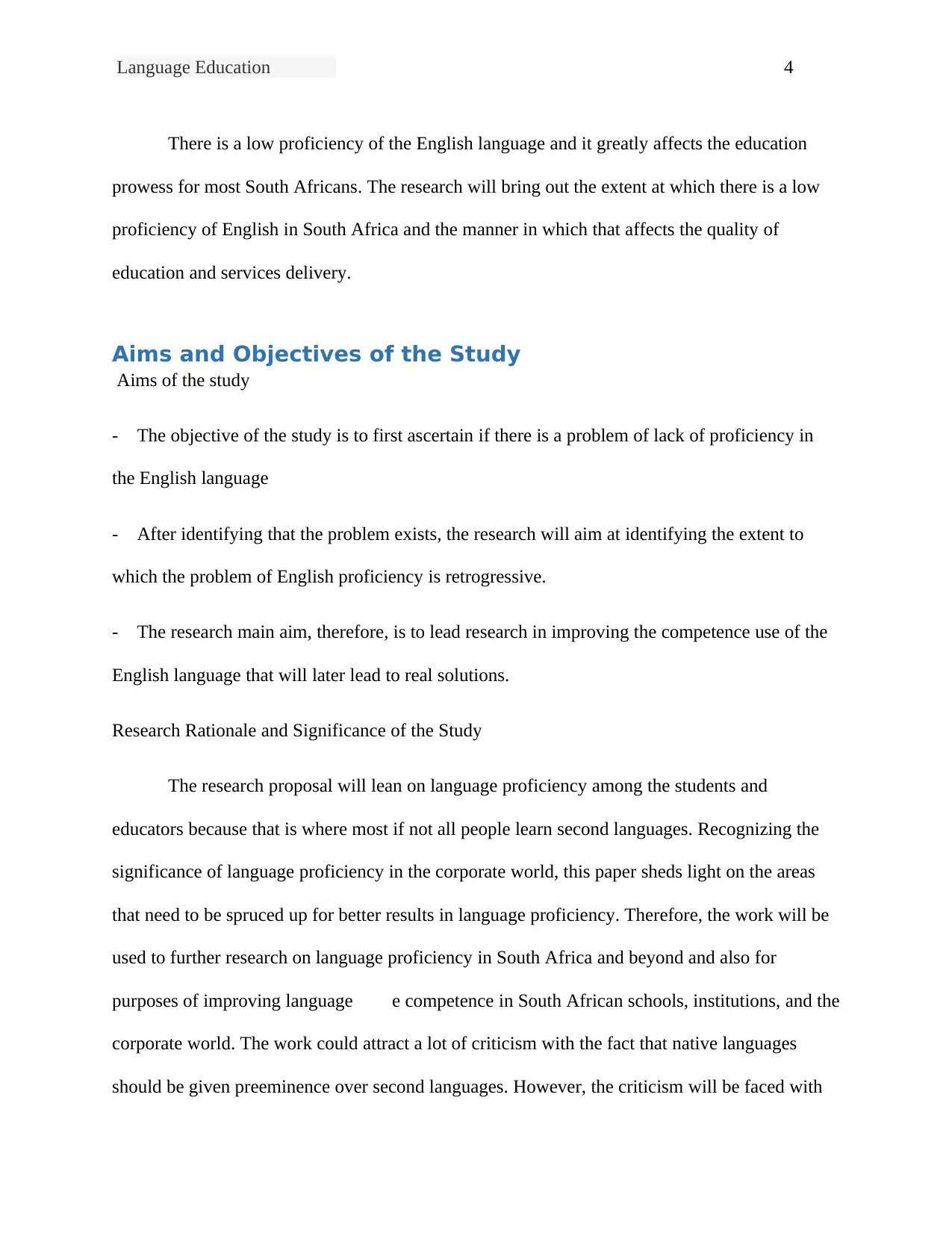
Language Education 4
There is a low proficiency of the English language and it greatly affects the education
prowess for most South Africans. The research will bring out the extent at which there is a low
proficiency of English in South Africa and the manner in which that affects the quality of
education and services delivery.
Aims and Objectives of the Study
Aims of the study
- The objective of the study is to first ascertain if there is a problem of lack of proficiency in
the English language
- After identifying that the problem exists, the research will aim at identifying the extent to
which the problem of English proficiency is retrogressive.
- The research main aim, therefore, is to lead research in improving the competence use of the
English language that will later lead to real solutions.
Research Rationale and Significance of the Study
The research proposal will lean on language proficiency among the students and
educators because that is where most if not all people learn second languages. Recognizing the
significance of language proficiency in the corporate world, this paper sheds light on the areas
that need to be spruced up for better results in language proficiency. Therefore, the work will be
used to further research on language proficiency in South Africa and beyond and also for
purposes of improving language e competence in South African schools, institutions, and the
corporate world. The work could attract a lot of criticism with the fact that native languages
should be given preeminence over second languages. However, the criticism will be faced with
There is a low proficiency of the English language and it greatly affects the education
prowess for most South Africans. The research will bring out the extent at which there is a low
proficiency of English in South Africa and the manner in which that affects the quality of
education and services delivery.
Aims and Objectives of the Study
Aims of the study
- The objective of the study is to first ascertain if there is a problem of lack of proficiency in
the English language
- After identifying that the problem exists, the research will aim at identifying the extent to
which the problem of English proficiency is retrogressive.
- The research main aim, therefore, is to lead research in improving the competence use of the
English language that will later lead to real solutions.
Research Rationale and Significance of the Study
The research proposal will lean on language proficiency among the students and
educators because that is where most if not all people learn second languages. Recognizing the
significance of language proficiency in the corporate world, this paper sheds light on the areas
that need to be spruced up for better results in language proficiency. Therefore, the work will be
used to further research on language proficiency in South Africa and beyond and also for
purposes of improving language e competence in South African schools, institutions, and the
corporate world. The work could attract a lot of criticism with the fact that native languages
should be given preeminence over second languages. However, the criticism will be faced with
Paraphrase This Document
Need a fresh take? Get an instant paraphrase of this document with our AI Paraphraser
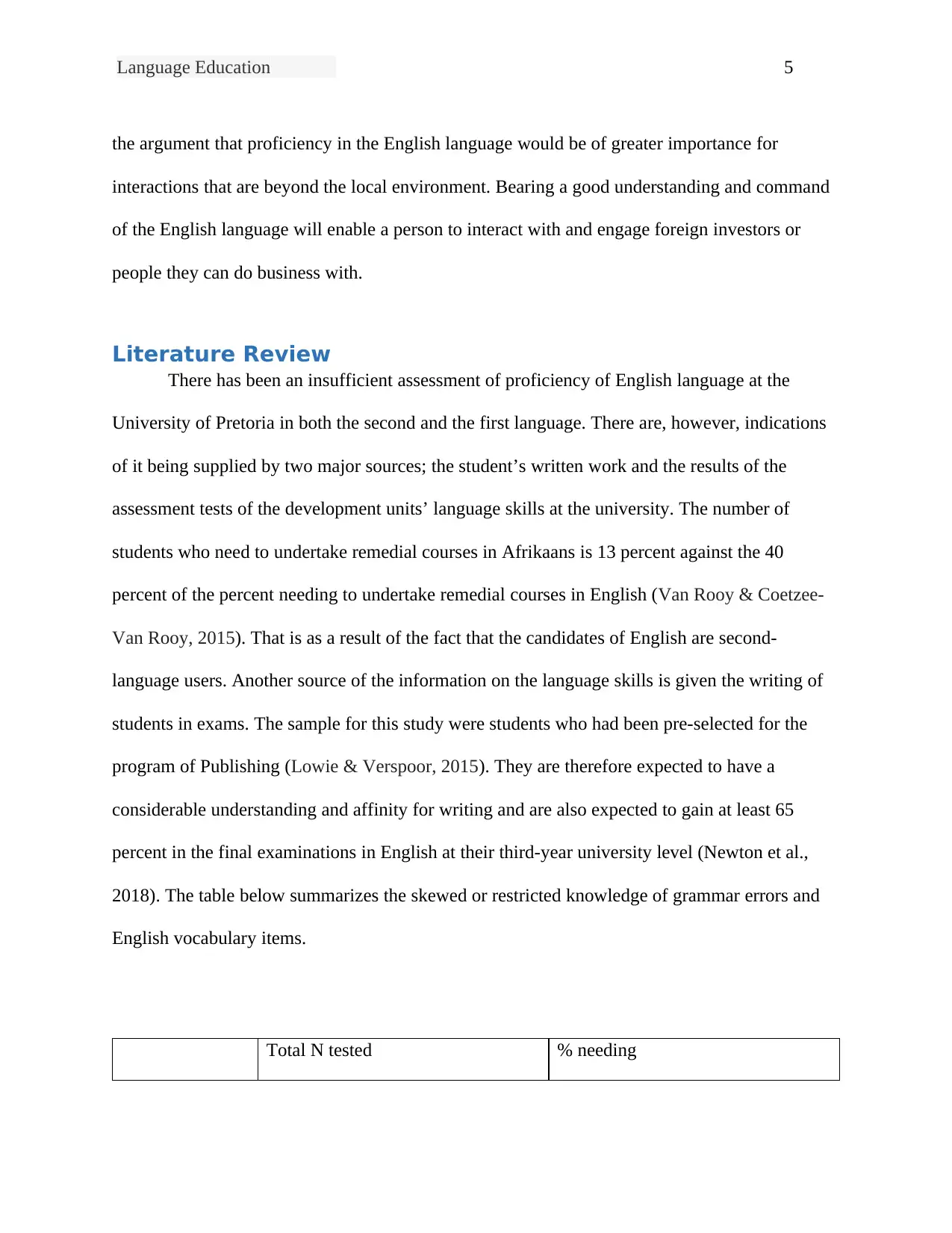
Language Education 5
the argument that proficiency in the English language would be of greater importance for
interactions that are beyond the local environment. Bearing a good understanding and command
of the English language will enable a person to interact with and engage foreign investors or
people they can do business with.
Literature Review
There has been an insufficient assessment of proficiency of English language at the
University of Pretoria in both the second and the first language. There are, however, indications
of it being supplied by two major sources; the student’s written work and the results of the
assessment tests of the development units’ language skills at the university. The number of
students who need to undertake remedial courses in Afrikaans is 13 percent against the 40
percent of the percent needing to undertake remedial courses in English (Van Rooy & Coetzee-
Van Rooy, 2015). That is as a result of the fact that the candidates of English are second-
language users. Another source of the information on the language skills is given the writing of
students in exams. The sample for this study were students who had been pre-selected for the
program of Publishing (Lowie & Verspoor, 2015). They are therefore expected to have a
considerable understanding and affinity for writing and are also expected to gain at least 65
percent in the final examinations in English at their third-year university level (Newton et al.,
2018). The table below summarizes the skewed or restricted knowledge of grammar errors and
English vocabulary items.
Total N tested % needing
the argument that proficiency in the English language would be of greater importance for
interactions that are beyond the local environment. Bearing a good understanding and command
of the English language will enable a person to interact with and engage foreign investors or
people they can do business with.
Literature Review
There has been an insufficient assessment of proficiency of English language at the
University of Pretoria in both the second and the first language. There are, however, indications
of it being supplied by two major sources; the student’s written work and the results of the
assessment tests of the development units’ language skills at the university. The number of
students who need to undertake remedial courses in Afrikaans is 13 percent against the 40
percent of the percent needing to undertake remedial courses in English (Van Rooy & Coetzee-
Van Rooy, 2015). That is as a result of the fact that the candidates of English are second-
language users. Another source of the information on the language skills is given the writing of
students in exams. The sample for this study were students who had been pre-selected for the
program of Publishing (Lowie & Verspoor, 2015). They are therefore expected to have a
considerable understanding and affinity for writing and are also expected to gain at least 65
percent in the final examinations in English at their third-year university level (Newton et al.,
2018). The table below summarizes the skewed or restricted knowledge of grammar errors and
English vocabulary items.
Total N tested % needing
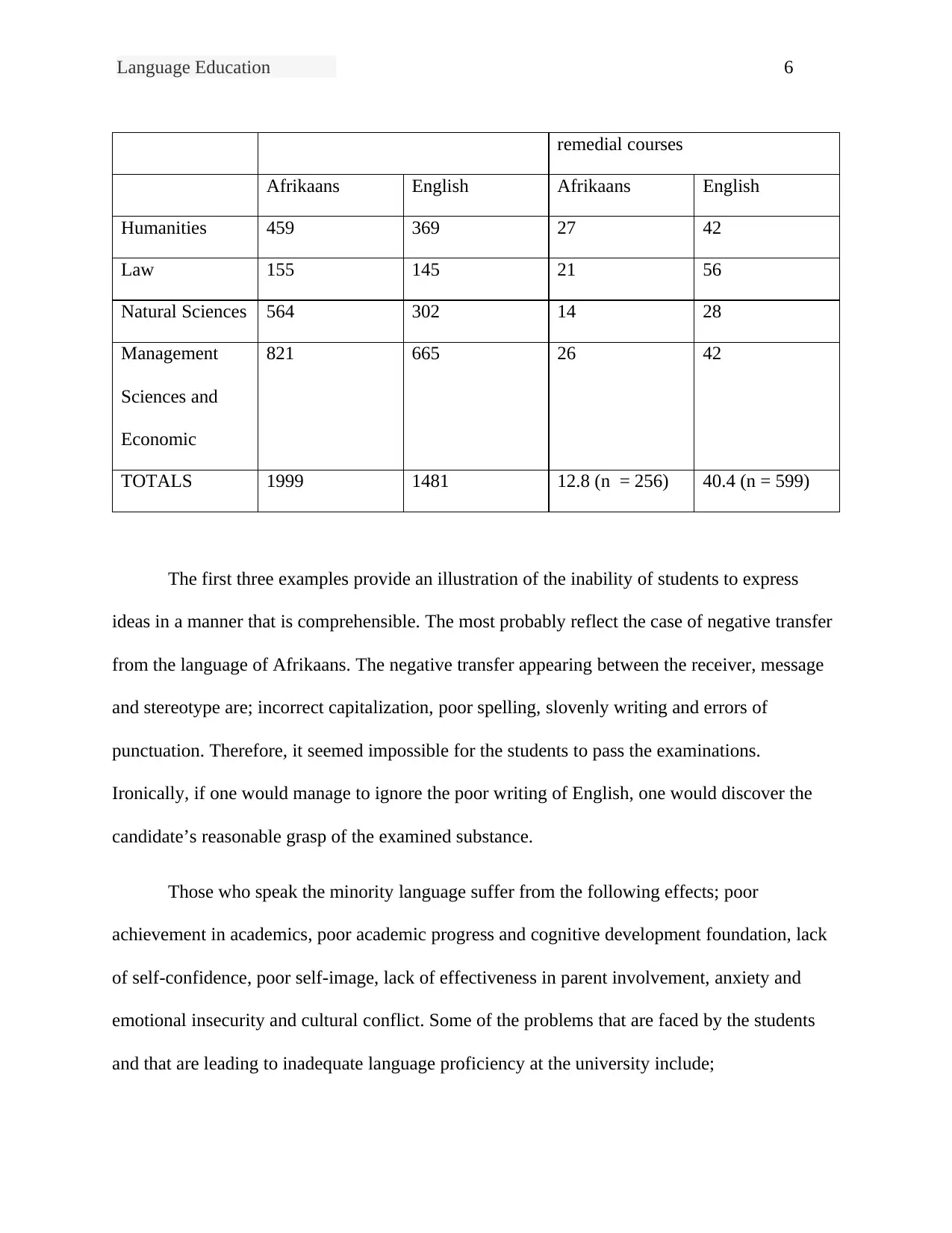
Language Education 6
remedial courses
Afrikaans English Afrikaans English
Humanities 459 369 27 42
Law 155 145 21 56
Natural Sciences 564 302 14 28
Management
Sciences and
Economic
821 665 26 42
TOTALS 1999 1481 12.8 (n = 256) 40.4 (n = 599)
The first three examples provide an illustration of the inability of students to express
ideas in a manner that is comprehensible. The most probably reflect the case of negative transfer
from the language of Afrikaans. The negative transfer appearing between the receiver, message
and stereotype are; incorrect capitalization, poor spelling, slovenly writing and errors of
punctuation. Therefore, it seemed impossible for the students to pass the examinations.
Ironically, if one would manage to ignore the poor writing of English, one would discover the
candidate’s reasonable grasp of the examined substance.
Those who speak the minority language suffer from the following effects; poor
achievement in academics, poor academic progress and cognitive development foundation, lack
of self-confidence, poor self-image, lack of effectiveness in parent involvement, anxiety and
emotional insecurity and cultural conflict. Some of the problems that are faced by the students
and that are leading to inadequate language proficiency at the university include;
remedial courses
Afrikaans English Afrikaans English
Humanities 459 369 27 42
Law 155 145 21 56
Natural Sciences 564 302 14 28
Management
Sciences and
Economic
821 665 26 42
TOTALS 1999 1481 12.8 (n = 256) 40.4 (n = 599)
The first three examples provide an illustration of the inability of students to express
ideas in a manner that is comprehensible. The most probably reflect the case of negative transfer
from the language of Afrikaans. The negative transfer appearing between the receiver, message
and stereotype are; incorrect capitalization, poor spelling, slovenly writing and errors of
punctuation. Therefore, it seemed impossible for the students to pass the examinations.
Ironically, if one would manage to ignore the poor writing of English, one would discover the
candidate’s reasonable grasp of the examined substance.
Those who speak the minority language suffer from the following effects; poor
achievement in academics, poor academic progress and cognitive development foundation, lack
of self-confidence, poor self-image, lack of effectiveness in parent involvement, anxiety and
emotional insecurity and cultural conflict. Some of the problems that are faced by the students
and that are leading to inadequate language proficiency at the university include;
⊘ This is a preview!⊘
Do you want full access?
Subscribe today to unlock all pages.

Trusted by 1+ million students worldwide
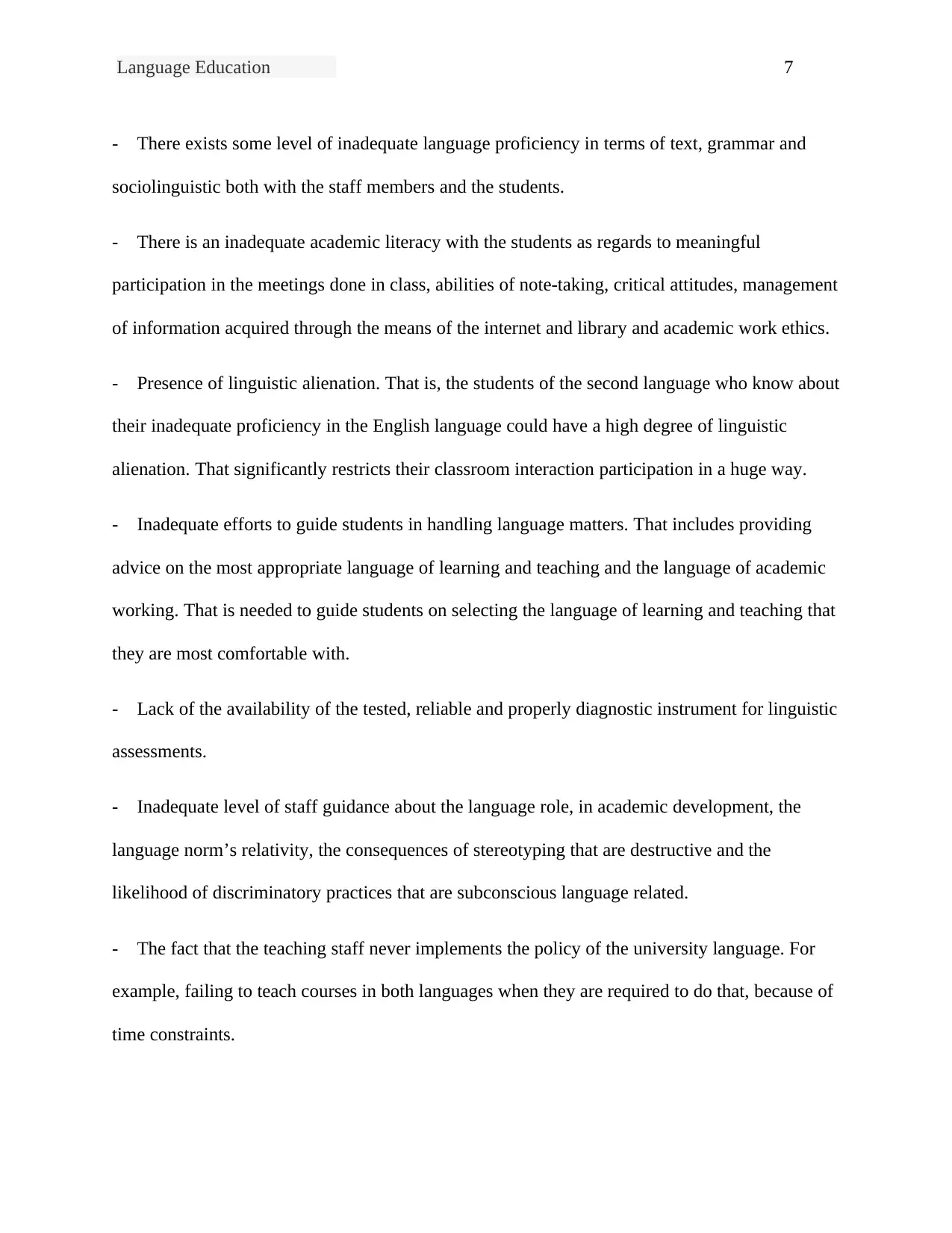
Language Education 7
- There exists some level of inadequate language proficiency in terms of text, grammar and
sociolinguistic both with the staff members and the students.
- There is an inadequate academic literacy with the students as regards to meaningful
participation in the meetings done in class, abilities of note-taking, critical attitudes, management
of information acquired through the means of the internet and library and academic work ethics.
- Presence of linguistic alienation. That is, the students of the second language who know about
their inadequate proficiency in the English language could have a high degree of linguistic
alienation. That significantly restricts their classroom interaction participation in a huge way.
- Inadequate efforts to guide students in handling language matters. That includes providing
advice on the most appropriate language of learning and teaching and the language of academic
working. That is needed to guide students on selecting the language of learning and teaching that
they are most comfortable with.
- Lack of the availability of the tested, reliable and properly diagnostic instrument for linguistic
assessments.
- Inadequate level of staff guidance about the language role, in academic development, the
language norm’s relativity, the consequences of stereotyping that are destructive and the
likelihood of discriminatory practices that are subconscious language related.
- The fact that the teaching staff never implements the policy of the university language. For
example, failing to teach courses in both languages when they are required to do that, because of
time constraints.
- There exists some level of inadequate language proficiency in terms of text, grammar and
sociolinguistic both with the staff members and the students.
- There is an inadequate academic literacy with the students as regards to meaningful
participation in the meetings done in class, abilities of note-taking, critical attitudes, management
of information acquired through the means of the internet and library and academic work ethics.
- Presence of linguistic alienation. That is, the students of the second language who know about
their inadequate proficiency in the English language could have a high degree of linguistic
alienation. That significantly restricts their classroom interaction participation in a huge way.
- Inadequate efforts to guide students in handling language matters. That includes providing
advice on the most appropriate language of learning and teaching and the language of academic
working. That is needed to guide students on selecting the language of learning and teaching that
they are most comfortable with.
- Lack of the availability of the tested, reliable and properly diagnostic instrument for linguistic
assessments.
- Inadequate level of staff guidance about the language role, in academic development, the
language norm’s relativity, the consequences of stereotyping that are destructive and the
likelihood of discriminatory practices that are subconscious language related.
- The fact that the teaching staff never implements the policy of the university language. For
example, failing to teach courses in both languages when they are required to do that, because of
time constraints.
Paraphrase This Document
Need a fresh take? Get an instant paraphrase of this document with our AI Paraphraser
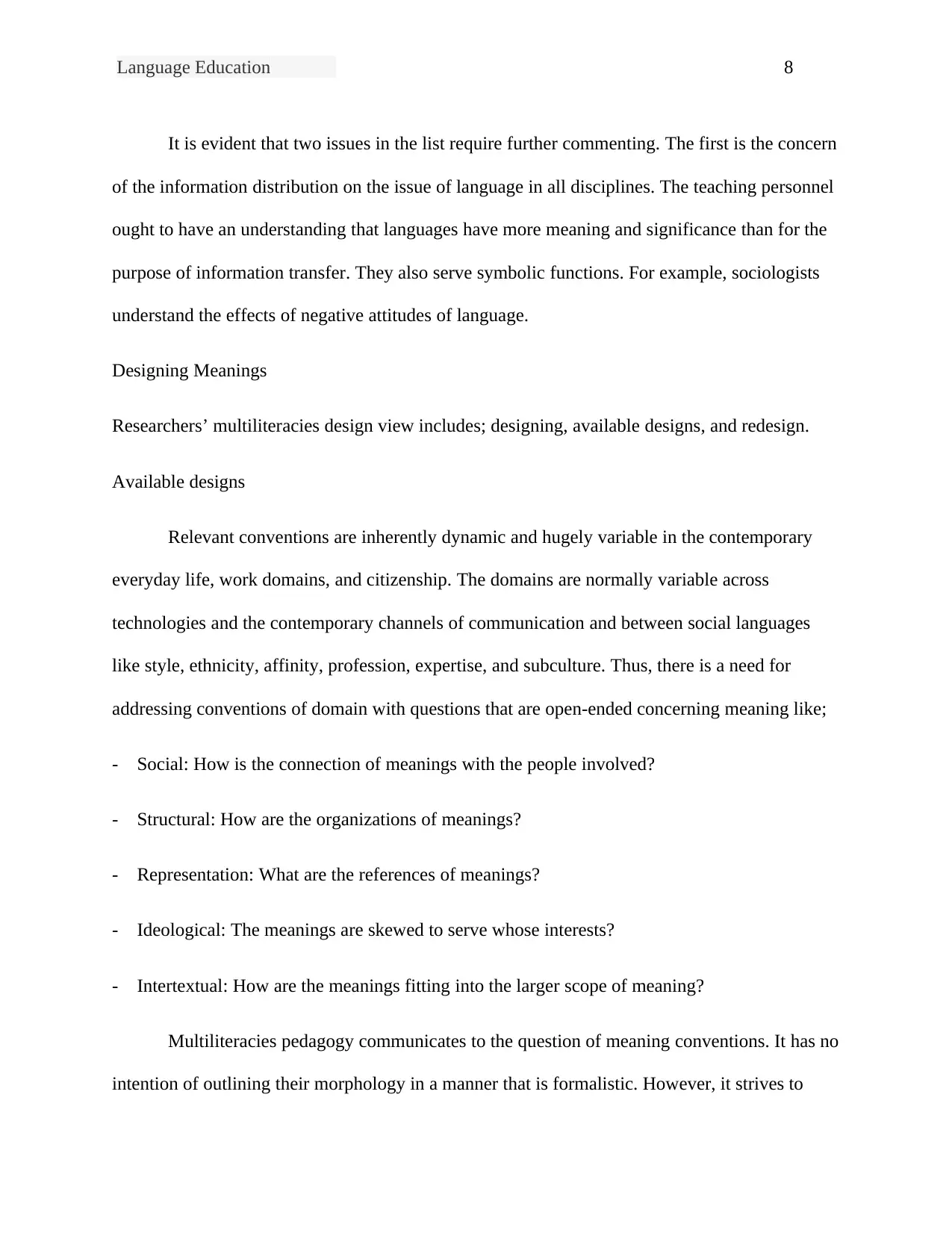
Language Education 8
It is evident that two issues in the list require further commenting. The first is the concern
of the information distribution on the issue of language in all disciplines. The teaching personnel
ought to have an understanding that languages have more meaning and significance than for the
purpose of information transfer. They also serve symbolic functions. For example, sociologists
understand the effects of negative attitudes of language.
Designing Meanings
Researchers’ multiliteracies design view includes; designing, available designs, and redesign.
Available designs
Relevant conventions are inherently dynamic and hugely variable in the contemporary
everyday life, work domains, and citizenship. The domains are normally variable across
technologies and the contemporary channels of communication and between social languages
like style, ethnicity, affinity, profession, expertise, and subculture. Thus, there is a need for
addressing conventions of domain with questions that are open-ended concerning meaning like;
- Social: How is the connection of meanings with the people involved?
- Structural: How are the organizations of meanings?
- Representation: What are the references of meanings?
- Ideological: The meanings are skewed to serve whose interests?
- Intertextual: How are the meanings fitting into the larger scope of meaning?
Multiliteracies pedagogy communicates to the question of meaning conventions. It has no
intention of outlining their morphology in a manner that is formalistic. However, it strives to
It is evident that two issues in the list require further commenting. The first is the concern
of the information distribution on the issue of language in all disciplines. The teaching personnel
ought to have an understanding that languages have more meaning and significance than for the
purpose of information transfer. They also serve symbolic functions. For example, sociologists
understand the effects of negative attitudes of language.
Designing Meanings
Researchers’ multiliteracies design view includes; designing, available designs, and redesign.
Available designs
Relevant conventions are inherently dynamic and hugely variable in the contemporary
everyday life, work domains, and citizenship. The domains are normally variable across
technologies and the contemporary channels of communication and between social languages
like style, ethnicity, affinity, profession, expertise, and subculture. Thus, there is a need for
addressing conventions of domain with questions that are open-ended concerning meaning like;
- Social: How is the connection of meanings with the people involved?
- Structural: How are the organizations of meanings?
- Representation: What are the references of meanings?
- Ideological: The meanings are skewed to serve whose interests?
- Intertextual: How are the meanings fitting into the larger scope of meaning?
Multiliteracies pedagogy communicates to the question of meaning conventions. It has no
intention of outlining their morphology in a manner that is formalistic. However, it strives to
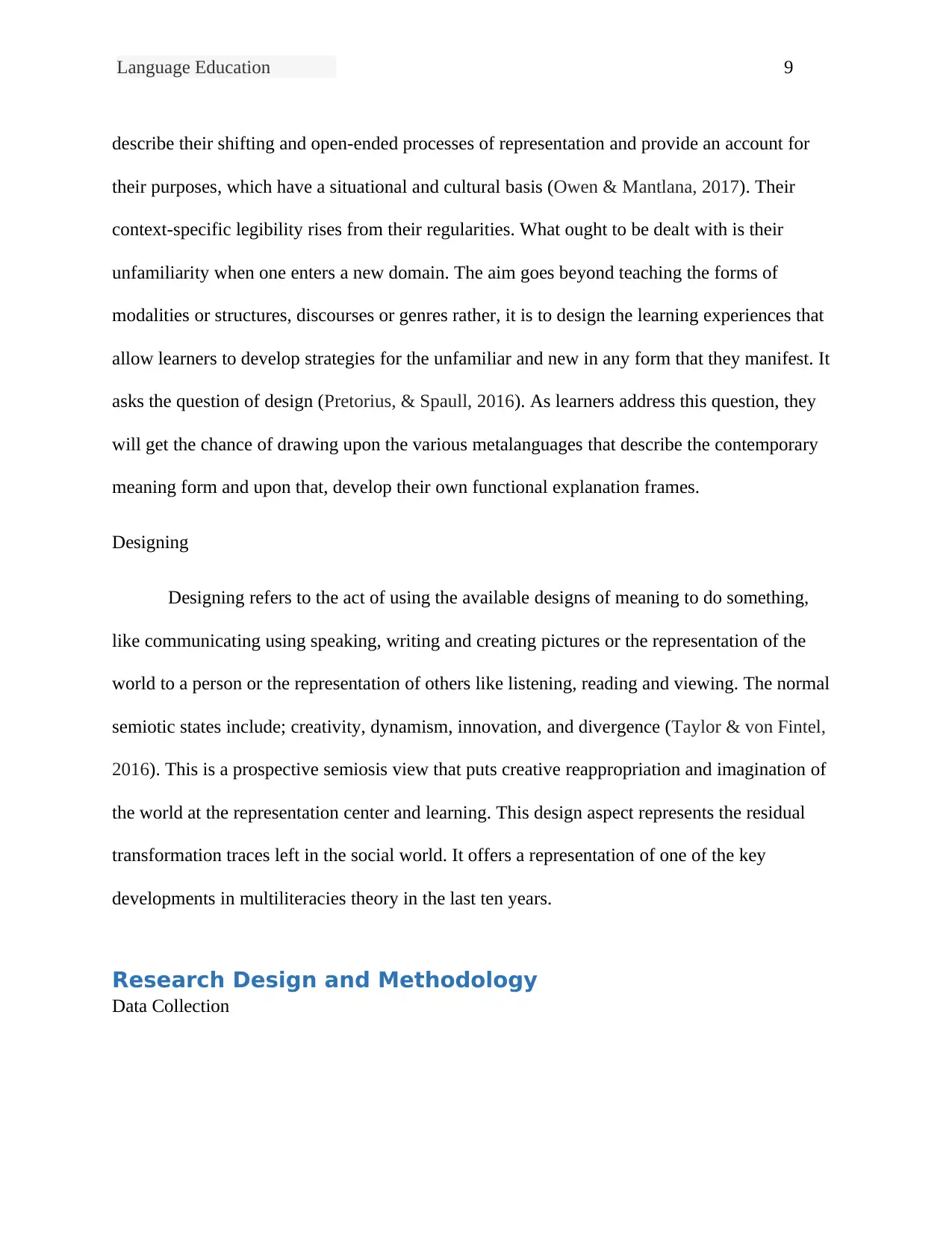
Language Education 9
describe their shifting and open-ended processes of representation and provide an account for
their purposes, which have a situational and cultural basis (Owen & Mantlana, 2017). Their
context-specific legibility rises from their regularities. What ought to be dealt with is their
unfamiliarity when one enters a new domain. The aim goes beyond teaching the forms of
modalities or structures, discourses or genres rather, it is to design the learning experiences that
allow learners to develop strategies for the unfamiliar and new in any form that they manifest. It
asks the question of design (Pretorius, & Spaull, 2016). As learners address this question, they
will get the chance of drawing upon the various metalanguages that describe the contemporary
meaning form and upon that, develop their own functional explanation frames.
Designing
Designing refers to the act of using the available designs of meaning to do something,
like communicating using speaking, writing and creating pictures or the representation of the
world to a person or the representation of others like listening, reading and viewing. The normal
semiotic states include; creativity, dynamism, innovation, and divergence (Taylor & von Fintel,
2016). This is a prospective semiosis view that puts creative reappropriation and imagination of
the world at the representation center and learning. This design aspect represents the residual
transformation traces left in the social world. It offers a representation of one of the key
developments in multiliteracies theory in the last ten years.
Research Design and Methodology
Data Collection
describe their shifting and open-ended processes of representation and provide an account for
their purposes, which have a situational and cultural basis (Owen & Mantlana, 2017). Their
context-specific legibility rises from their regularities. What ought to be dealt with is their
unfamiliarity when one enters a new domain. The aim goes beyond teaching the forms of
modalities or structures, discourses or genres rather, it is to design the learning experiences that
allow learners to develop strategies for the unfamiliar and new in any form that they manifest. It
asks the question of design (Pretorius, & Spaull, 2016). As learners address this question, they
will get the chance of drawing upon the various metalanguages that describe the contemporary
meaning form and upon that, develop their own functional explanation frames.
Designing
Designing refers to the act of using the available designs of meaning to do something,
like communicating using speaking, writing and creating pictures or the representation of the
world to a person or the representation of others like listening, reading and viewing. The normal
semiotic states include; creativity, dynamism, innovation, and divergence (Taylor & von Fintel,
2016). This is a prospective semiosis view that puts creative reappropriation and imagination of
the world at the representation center and learning. This design aspect represents the residual
transformation traces left in the social world. It offers a representation of one of the key
developments in multiliteracies theory in the last ten years.
Research Design and Methodology
Data Collection
⊘ This is a preview!⊘
Do you want full access?
Subscribe today to unlock all pages.

Trusted by 1+ million students worldwide
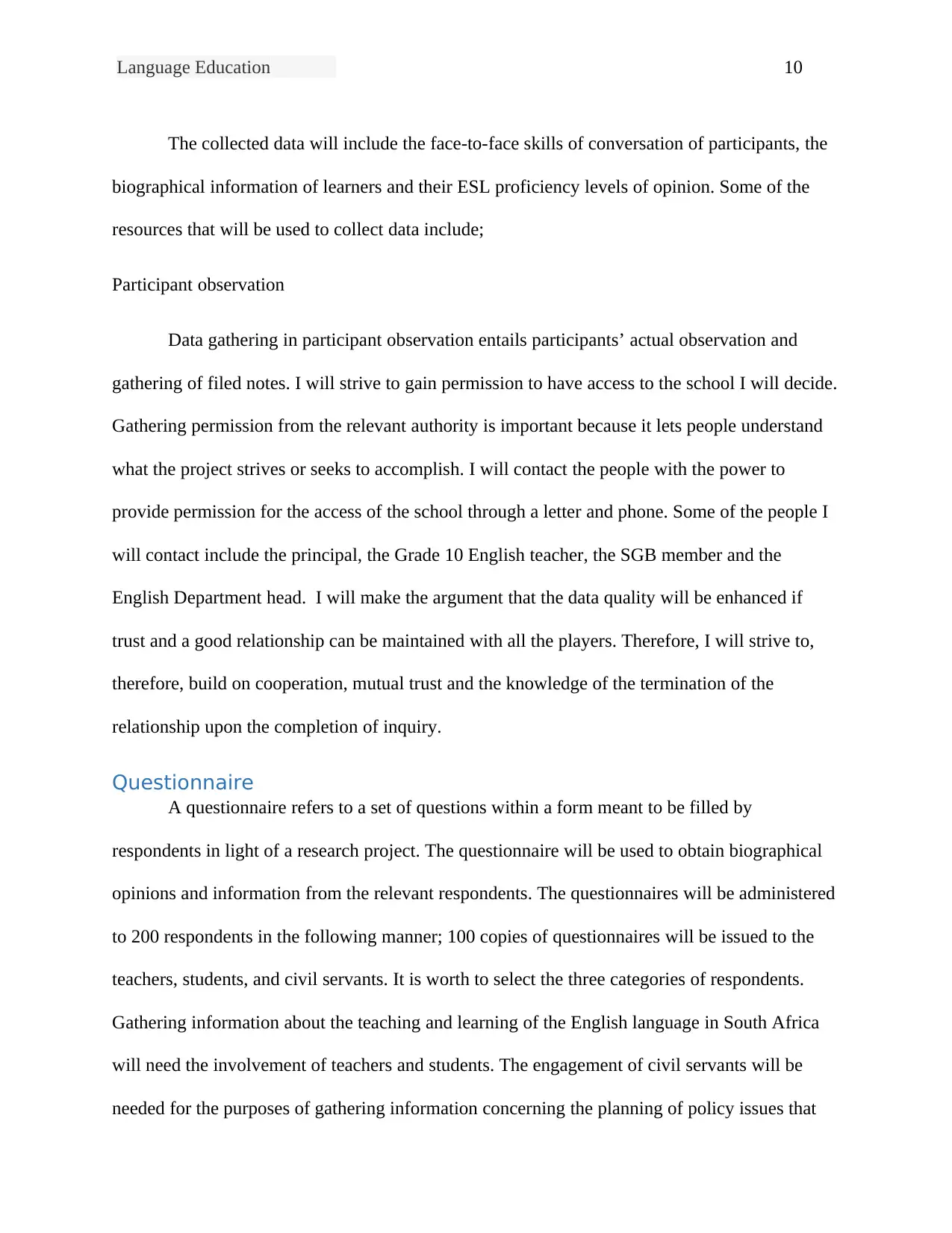
Language Education 10
The collected data will include the face-to-face skills of conversation of participants, the
biographical information of learners and their ESL proficiency levels of opinion. Some of the
resources that will be used to collect data include;
Participant observation
Data gathering in participant observation entails participants’ actual observation and
gathering of filed notes. I will strive to gain permission to have access to the school I will decide.
Gathering permission from the relevant authority is important because it lets people understand
what the project strives or seeks to accomplish. I will contact the people with the power to
provide permission for the access of the school through a letter and phone. Some of the people I
will contact include the principal, the Grade 10 English teacher, the SGB member and the
English Department head. I will make the argument that the data quality will be enhanced if
trust and a good relationship can be maintained with all the players. Therefore, I will strive to,
therefore, build on cooperation, mutual trust and the knowledge of the termination of the
relationship upon the completion of inquiry.
Questionnaire
A questionnaire refers to a set of questions within a form meant to be filled by
respondents in light of a research project. The questionnaire will be used to obtain biographical
opinions and information from the relevant respondents. The questionnaires will be administered
to 200 respondents in the following manner; 100 copies of questionnaires will be issued to the
teachers, students, and civil servants. It is worth to select the three categories of respondents.
Gathering information about the teaching and learning of the English language in South Africa
will need the involvement of teachers and students. The engagement of civil servants will be
needed for the purposes of gathering information concerning the planning of policy issues that
The collected data will include the face-to-face skills of conversation of participants, the
biographical information of learners and their ESL proficiency levels of opinion. Some of the
resources that will be used to collect data include;
Participant observation
Data gathering in participant observation entails participants’ actual observation and
gathering of filed notes. I will strive to gain permission to have access to the school I will decide.
Gathering permission from the relevant authority is important because it lets people understand
what the project strives or seeks to accomplish. I will contact the people with the power to
provide permission for the access of the school through a letter and phone. Some of the people I
will contact include the principal, the Grade 10 English teacher, the SGB member and the
English Department head. I will make the argument that the data quality will be enhanced if
trust and a good relationship can be maintained with all the players. Therefore, I will strive to,
therefore, build on cooperation, mutual trust and the knowledge of the termination of the
relationship upon the completion of inquiry.
Questionnaire
A questionnaire refers to a set of questions within a form meant to be filled by
respondents in light of a research project. The questionnaire will be used to obtain biographical
opinions and information from the relevant respondents. The questionnaires will be administered
to 200 respondents in the following manner; 100 copies of questionnaires will be issued to the
teachers, students, and civil servants. It is worth to select the three categories of respondents.
Gathering information about the teaching and learning of the English language in South Africa
will need the involvement of teachers and students. The engagement of civil servants will be
needed for the purposes of gathering information concerning the planning of policy issues that
Paraphrase This Document
Need a fresh take? Get an instant paraphrase of this document with our AI Paraphraser
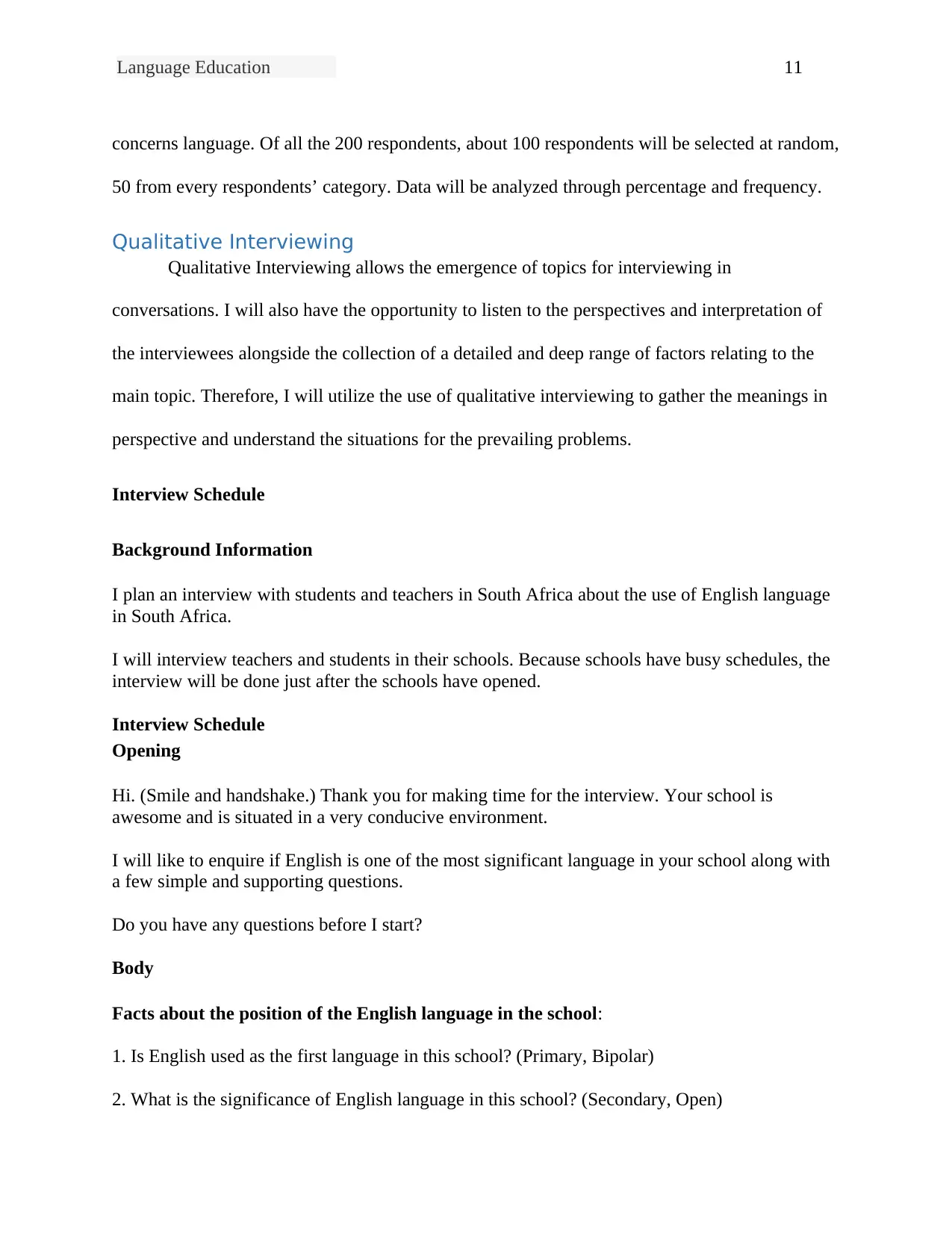
Language Education 11
concerns language. Of all the 200 respondents, about 100 respondents will be selected at random,
50 from every respondents’ category. Data will be analyzed through percentage and frequency.
Qualitative Interviewing
Qualitative Interviewing allows the emergence of topics for interviewing in
conversations. I will also have the opportunity to listen to the perspectives and interpretation of
the interviewees alongside the collection of a detailed and deep range of factors relating to the
main topic. Therefore, I will utilize the use of qualitative interviewing to gather the meanings in
perspective and understand the situations for the prevailing problems.
Interview Schedule
Background Information
I plan an interview with students and teachers in South Africa about the use of English language
in South Africa.
I will interview teachers and students in their schools. Because schools have busy schedules, the
interview will be done just after the schools have opened.
Interview Schedule
Opening
Hi. (Smile and handshake.) Thank you for making time for the interview. Your school is
awesome and is situated in a very conducive environment.
I will like to enquire if English is one of the most significant language in your school along with
a few simple and supporting questions.
Do you have any questions before I start?
Body
Facts about the position of the English language in the school:
1. Is English used as the first language in this school? (Primary, Bipolar)
2. What is the significance of English language in this school? (Secondary, Open)
concerns language. Of all the 200 respondents, about 100 respondents will be selected at random,
50 from every respondents’ category. Data will be analyzed through percentage and frequency.
Qualitative Interviewing
Qualitative Interviewing allows the emergence of topics for interviewing in
conversations. I will also have the opportunity to listen to the perspectives and interpretation of
the interviewees alongside the collection of a detailed and deep range of factors relating to the
main topic. Therefore, I will utilize the use of qualitative interviewing to gather the meanings in
perspective and understand the situations for the prevailing problems.
Interview Schedule
Background Information
I plan an interview with students and teachers in South Africa about the use of English language
in South Africa.
I will interview teachers and students in their schools. Because schools have busy schedules, the
interview will be done just after the schools have opened.
Interview Schedule
Opening
Hi. (Smile and handshake.) Thank you for making time for the interview. Your school is
awesome and is situated in a very conducive environment.
I will like to enquire if English is one of the most significant language in your school along with
a few simple and supporting questions.
Do you have any questions before I start?
Body
Facts about the position of the English language in the school:
1. Is English used as the first language in this school? (Primary, Bipolar)
2. What is the significance of English language in this school? (Secondary, Open)

Language Education 12
3. How often do you communicate in English? (Primary, Closed)
Closing
Thank him for his time.
I have really learned a lot.
Handshake, good bye.
Ethical Considerations
Informed consent is one of the ethical issues that I will consider in carrying out the
research. In that case, the research process will not force or manipulate anybody to provide
information as pertains to data collection. Only willing persons will be used as respondents. In as
much as small incentives will be used to boost the willingness and morale for participation, it
will be issued to a level not encouraging manipulation.
Beneficence will also be at the core of our research. The manner in which the research
will be structured and developed will strive to underscore the bigger purpose of creating
solutions. The research will strive to trigger the need for the formulation of the solutions for the
benefit of the South African community as a whole.
Conclusion
The significance of the English language in South Africa not only for educational
purposes but also for the daily work routines. This proposal presents the direction that the
research will take through the problem statement. The problem that will serve as the reason for
the research is to find out the reason for the lack of proficiency in the English language in South
Africa. The proposal demonstrates the substance of the topic’s reality through the literature
review outlining the condition of learning institutions in the area of English language
3. How often do you communicate in English? (Primary, Closed)
Closing
Thank him for his time.
I have really learned a lot.
Handshake, good bye.
Ethical Considerations
Informed consent is one of the ethical issues that I will consider in carrying out the
research. In that case, the research process will not force or manipulate anybody to provide
information as pertains to data collection. Only willing persons will be used as respondents. In as
much as small incentives will be used to boost the willingness and morale for participation, it
will be issued to a level not encouraging manipulation.
Beneficence will also be at the core of our research. The manner in which the research
will be structured and developed will strive to underscore the bigger purpose of creating
solutions. The research will strive to trigger the need for the formulation of the solutions for the
benefit of the South African community as a whole.
Conclusion
The significance of the English language in South Africa not only for educational
purposes but also for the daily work routines. This proposal presents the direction that the
research will take through the problem statement. The problem that will serve as the reason for
the research is to find out the reason for the lack of proficiency in the English language in South
Africa. The proposal demonstrates the substance of the topic’s reality through the literature
review outlining the condition of learning institutions in the area of English language
⊘ This is a preview!⊘
Do you want full access?
Subscribe today to unlock all pages.

Trusted by 1+ million students worldwide
1 out of 15
Related Documents
Your All-in-One AI-Powered Toolkit for Academic Success.
+13062052269
info@desklib.com
Available 24*7 on WhatsApp / Email
![[object Object]](/_next/static/media/star-bottom.7253800d.svg)
Unlock your academic potential
Copyright © 2020–2026 A2Z Services. All Rights Reserved. Developed and managed by ZUCOL.





